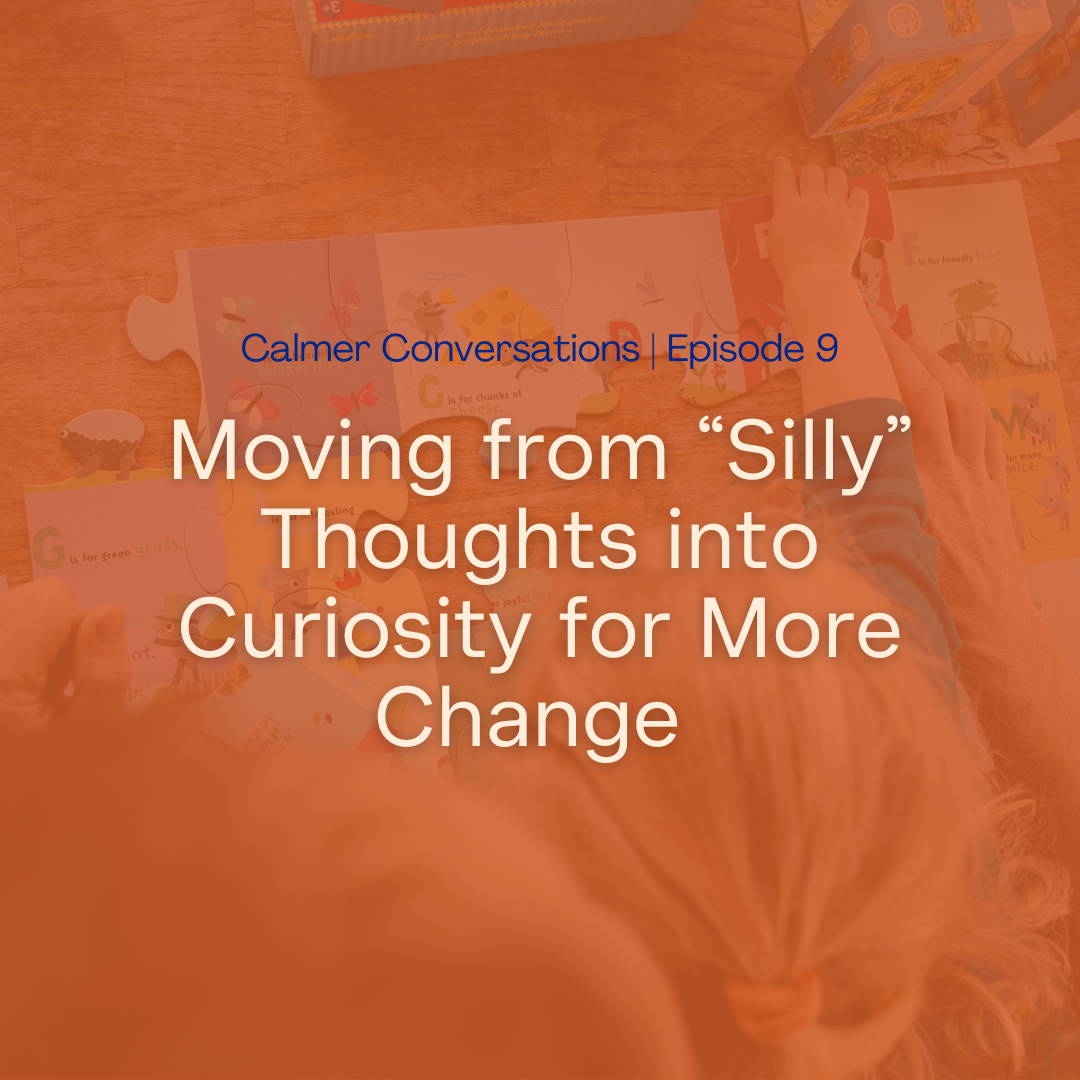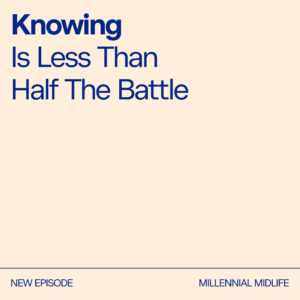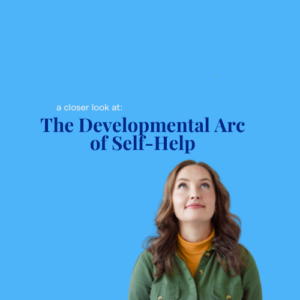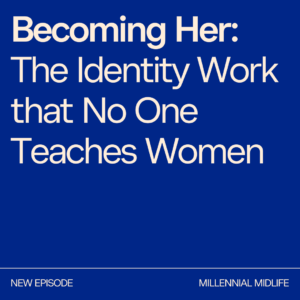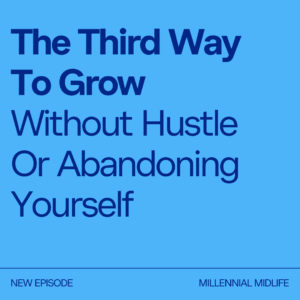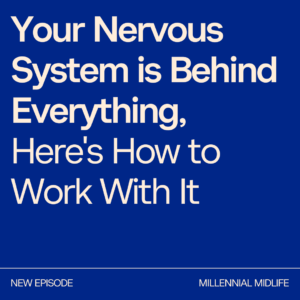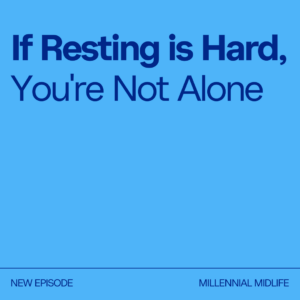Cecelia Baum Mandryk (00:02.562)
Hi, and welcome to Calmer Conversations, episode number nine. I’m Cecilia, your host. Let’s get started. Today, the episode is all about silly thoughts, more specifically that there are no silly thoughts or that what we judge as silly thoughts are actually not silly. And while this sounds a little bit funny to you using the word silly so many times, I think this is something that comes up quite a lot, particularly for
people who have an active cognitive brain or consider themselves to be overachievers or really understand the logic behind things that are happening within their brain and how that can actually trip us up. So I want to frame it by this instance that happens to me pretty regularly as I coach both in groups and individually. And that’s that somebody will explain something to me. They’ll explain the thought they’re having. They’ll explain something that’s going on.
And then they’ll very quickly say, it’s a silly thought, or I shouldn’t be having that thought. Or they’ll kind of push it away as something that doesn’t make sense. And most of our thoughts don’t make sense. So that’s the first point that I want to make today, is that most of the thoughts that are going on in our head and most of the beliefs that we have when we start to interrogate them, that is look at them, bring awareness to them, don’t make a lot of sense.
They don’t actually support us in the life we’re living. They’re not actually things we really get on board with or buy into, but that doesn’t mean that they’re not there. And this really interesting thing happens when you call your thought silly. So this came up, I’m gonna give you the thing that just popped into my head most recently. I was having a consult with somebody talking about working together and they explained that they had this silly.
you know, I’m using air quotes if you’re not watching this on YouTube is I’m having this silly thought that I don’t like to get dirty or sweaty when I exercise. And that’s the thing that’s keeping me from exercising. And thinking that thought is silly, which we could say, okay, that is silly, because you could take a shower. And there’s so many ways to mitigate that, right. But as soon as you say that something is silly, what you do is you put your brain and you put your nervous system into resistance.
Cecelia Baum Mandryk (02:20.262)
And if you’ve been following along or you’ve listened to some of my other episodes, you know that as soon as your brain is in resistance, as soon as your nervous system is in resistance, it’s much harder to make change. And so many of us go through our lives kind of recognizing the thoughts that are driving what we do, but then very quickly judging them. And that negates our ability to work with them. I want to say that again, because it’s so important. So most of us
We, so we’ll have this thought like, I don’t want to get dirty. And instead of working with that thought, what we do is we judge it immediately. We judge it as a silly thought or kind of a ridiculous thought. And what that does, we think that that pushes the thought aside. But what it’s actually doing is putting your nervous system into resistance. It’s putting your brain into resistance and it actually helps that thought gain a little bit more stickiness, stick around. It makes it harder for your brain to move on from where you are. And this is where
curiosity really shines, right? So one of the things that I work with people on doing, and what I think is so important if you do wanna change and you wanna feel differently in your life, is leaning into the curiosity. And before we start talking about the curiosity, I wanna come at this with one other angle because I think that people either come at it in one of two ways. They already kind of are aware of a thought that they’re having and they judge it as silly, or…
They start to do this work and they start to learn the thoughts that I have are impacting what I do and how I feel. Okay, now I want to start to change my thoughts. And they start to become more more aware of their thoughts. And the more aware of their thoughts that they become, the kind of more silly or more ridiculous they think some of the thoughts are, right? So they haven’t been aware of them before, but then they do become aware of them and they think with their adult brain, well, that’s ridiculous, right?
Like, of course I’m not going to be abandoned for sending an email an hour late, right? Of course I’m not going to get fired for that. And so they judge the thought that they’re having as ridiculous, as silly, as something they shouldn’t be having. And we think that once we have this judgment, that this will help us change, right? And this is the same kind of logic that leads us down the path of, if I shame myself, then I will do differently and I will do better next time.
Cecelia Baum Mandryk (04:37.87)
Carl Rogers has this really beautiful quote that I’m not gonna be able to pull up right now, because it just came into my brain as I was talking, but about how we can’t make change from a place of shame. We can’t make change from this place of doubting ourselves, of thinking we’re not good enough, of thinking it’s not possible for us. And while it sounds pretty innocuous to say, well, that’s just a silly thought, essentially what you’re doing is you’re judging and shaming yourself in that space. You’re judging something that happened in your own brain.
And when you do that, you’re making it really hard to change. And so I am bringing this up because I think it’s really powerful to become aware of it and become cognizant of it. And also just to spend a moment talking about how most of the thoughts, and I’ve already said this, but we’re gonna dive into it more right now, is that most of the thoughts we have don’t make logical sense, right? I took a few economics classes, but was not like an econ major or anything.
But I’m familiar enough with the rational man that the economists talk about, right? This version of a human who only makes rational decisions. And we like to think, or at least as somebody who’s educated in the sciences, we kind of are sold this idea that once we had the scientific method and once we’re educated enough that our brain will only be a logical thinking machine.
And every thought we think will make complete sense and anything that doesn’t fit in will just kind of fall away. And we expect our brains to do that, right? Everything will make total sense. But the truth is your brain and the primitive part of your brain specifically in this part that holds onto this, like the belief systems and the structures in your, that help you operate, isn’t based on logic.
Right, it’s based on conserving, and we’re gonna go back to the motivational triad again, right? It’s based on conserving energy. It’s based on keeping you alive and safe. It’s based on seeking out some of those hedonic pleasures that we have in life. And so this part of your brain is the one who starts to make these neural pathways, these belief systems, these kind of chains of thought that happen in our brain over and over again. These also,
Cecelia Baum Mandryk (06:53.642)
aren’t coming generally from your present day self with all of the knowledge you have today. Most of these thoughts and beliefs that you have were solidified in your brain before you were seven years old, right? So they were from a long time ago and they weren’t based on you thinking logically. They were based on one or two experiences that were very influential in your life. They’re based on something a parent or caregiver said repeatedly.
They’re based on things that you heard over and over again at school or in church or in your community centers or wherever you spend a lot of time growing up on TV shows with commercials. Those were where these thoughts were. That’s where they began. Right. And this part of your brain, because it is so keen on conserving energy and keeping you safe, it really doesn’t have a lot of motivation to change these. Because if at some point this kept you safe, this part of your brain says,
then it still must keep you safe, right? It still must be the thing that we should think to keep us safe. This is the thing that helped, you know, get my needs met when I was four years old. So I will keep thinking in this way so that I am acceptable to people around me. And so the thoughts that you have today as a 25 year old or 35 year old or 65 year old are not silly. They are thoughts that made a lot of sense to a prior version of you.
Right? So these thoughts, if we can see them for what they are, which are kind of like these historical artifacts of how we grew up, of the society we were in, of the parents we had, of their upbringing and what they were bringing to the table of all of these different things, suddenly we can stop judging these thoughts and we can start accepting them for what they are. Which again, it’s just that artifact, right? It’s not,
It’s not a condemnation of your logical thinking capacity right now, today in 2024, whenever you’re listening to this. It is a way of noticing where you came from and the history that your brain is carrying. And so this is where the curiosity comes in, right? So with that kind of knowledge base of knowing that this part of your brain is not very logical at all, it really
Cecelia Baum Mandryk (09:14.232)
I mean, logic doesn’t totally come in when you need to survive, right? You just need to survive. And logic doesn’t come in a lot of times when we’re trying to conserve energy. And at least in this regard, because your brain, when it’s conserving energy, it wants to use the same thought over and over again, because then it doesn’t need to use brain power. So it can save the glucose stores for something else. So it’s going to use the same thought over and over again until you intentionally change it so that it can conserve energy.
And again, this is really important to know because these are why these thoughts keep coming back. And if I go back to my analogy of the lines of code in a computer program, they’re just there, right? Somebody wrote them however long ago in this open source computer program of your brain, and they’re gonna keep showing up over and over again until you take the time to change them because they won’t just magically go away, right? They don’t just like magically disappear just because you’re more logical.
or your prefrontal cortex developed, or now you have a different way of looking at the world, right? And the most practiced thought, the most practiced belief, which is the one that your brain has been using over and over again, the deepest neural pathway, if you want to think of it, again, physically like an actual stream or riverbed, that one is the one that usually gets the most air time, and your brain will default to, particularly in moments of stress, or when you’re feeling frustrated.
or just when it needs to conserve the most energy. So that’s where your brain goes the most, the easiest, right? That’s where, that’s the easiest path. The path of least resistance, I think is the term I’m looking for, that it will continue to go down. And so we have this chance when we notice these thoughts, instead of judging them as silly, and this is where, again, where curiosity starts to come in, instead of judging them as silly is to say, isn’t that so interesting?
Isn’t that so interesting that that’s where my brain went. That’s what my brain thinks on default mode, right? Essentially what you’re you’re becoming aware of when you build this awareness skills, you’re becoming aware of what your default mode is. You’re becoming aware of all of these lines of code that have been running in your life for years, probably if you’re listening to this, but that you didn’t quite know about.
Cecelia Baum Mandryk (11:30.306)
Right, somebody said in one of our sessions the other day, they said, you know this work, it can be really hard. And I was going to say like, now, like I’m feeling all these ways I wasn’t feeling before, but actually it’s now just like that I’m aware of what I’m thinking and what I’m feeling in a way that I wasn’t before. And I think that’s really true because these thoughts have been running your life for years. You just haven’t been aware of them. And when you become aware of them, it’s really easy to think like, that’s silly or that’s stupid, or I don’t even want to say this. Like a lot of times clients will say like, I’m even
I’m embarrassed to bring this up or I don’t feel like I should be sharing this thought or this thought makes me sound selfish or it makes me sound childish or whatever it is, right? We have this some judgment of the thought, but knowing that this is the thought is the most powerful thing, right? And keeping your brain even noticing that you go into judgment and saying, well, that’s a totally normal human thing to do. And I’m gonna pause and to see if I can step back into curiosity.
I’m to see if I can start to say, isn’t that so interesting that that’s what my brain thinks? Isn’t it so interesting that left to its own devices, this is where my brain goes and this is its default thinking. And then you can start to move into processing and working through it, right? So you can start to, and these will all make sense to different people at different times. And so you can kind of pick something that resonates with you. But for some people, it really makes sense to just humanize it.
Right? To say like, that’s such a human way of thinking and ask, is that thought still serving me? Or do I believe that? Do I, do I still even think that’s true right now? Or is that something that I want to be worried about? And bringing that sort of inquisition in this like gentle questioning can start to dissolve the thought that’s there. And sometimes actually just knowing that you’re having the thought is all you need to do to change it. Right? You don’t need to do
Anything else to change the thought you’re having you just need to become aware of that’s the thought that was driving what I do like a while ago in a workshop that I did somebody mentioned that When we were we were talking about getting outside and walking again, and so two physical examples today But they said that they they didn’t want to go for a walk because they thought it was boring Like there was a thought in their head that going for the walk was going to be boring But as soon as they said it out loud, they knew that that wasn’t true for them
Cecelia Baum Mandryk (13:51.598)
that they actually enjoyed going out for walks. They liked seeing what birds were there and what the weather was like and what was happening outside in their environment. And so as soon as they were aware that their brain had been repeating this thought, walks are boring, which nobody’s going to go for a walk if they think it’s boring for the most part, right? Then all of a sudden they could shift and change and work with it and start to think or lean into the thoughts that they already believed that were different, right? Which is I like seeing what birds are out. Like I’m curious to see what birds are around today.
now that we’re moving, we’re starting to move into fall, right? So when you stay in curiosity, when you lean into the curiosity in your brain, instead of going into that silly, that’s judgment, you get the capacity to work with the thought. And that’s ultimately what this is about. And it’s not even that you have to change the thought once you become aware of it and you’re in curiosity, but at least you get to start to interrogate it in a different way. You start to think about it, you start to ask, is this what I wanna think? Is this serving me in my life?
Is this a thought that I’ve had for a long time over and over again, but it actually needs to be updated. It doesn’t fit in with my current worldview or my current view of myself. And this is how you start to shift your self -concept. This is how you start to align your actions and your belief systems with what you do in the world. This can…
be a remedy for a lot of cognitive dissonance, right? And I know it sounds like all I have to do is stop calling my thoughts silly, which again is a simple answer, but it’s not always easy, right? We so very frequently will go to judgment as human beings, we very quickly will switch into that space. And so stepping back and saying, I don’t wanna judge myself anymore, that’s not where we wanna go. When I judge myself, I’m gonna notice what I’m doing, I’m gonna get curious.
Another practice that sometimes people find is helpful, so I said humanizing things, but then also forgiving yourself, right? So I forgive myself for buying into the idea that walks were boring, right? Sometimes we know where the thought comes from, right? We can remember somebody in our life saying it, and so we can notice that, and we might even forgive that person, right? Or we might hand the thought back.
Cecelia Baum Mandryk (16:07.532)
Right? I know that this thought is not my own. I am now handing it back to my mother. Right? I’m now handing it back to my first grade teacher. It is no longer mine. I’m no longer going to carry it. I’m choosing now to set this thought down. And I forgive myself for buying into this thought and for believing it for all these years. I no longer have to. Another practice that can be really helpful for people is having the intention to see something differently.
And if you believe in God or the universe or anything like that, you can start to tap into those, you don’t have to, right? You can simply have the intention to say, I’d like to see this differently. I’d like to believe something different about how I showed up at work today. I’d like to see myself differently in this situation. I’d like to help me see this differently, right? So if you do believe in some deity,
or even the universe, can call on help from those people, right? So you can say like, dear God, please help me see this differently, or I’m willing to see this differently, I want to see this differently. And having that intention, again, starts to open your brain up to seeing different things. So those are three different places you can start. But again, really bringing awareness to your brain when it goes to this place, when it goes to this spot of, I’m judging myself, I’m calling myself.
logical or silly or stupid or whatever word your brain goes to. And just noticing that like, again, first of all, almost none of us have all logical thoughts and expecting that from yourself is an unrealistic expectation. And noting that as soon as you can become aware of these thoughts, and instead of move moving into judgment, or even if you do move into judgment, then moving back into curiosity.
can help you shift and change them. And that’s the most important part if you wanna feel differently in life and if you wanna do different things. So if you wanna feel calmer, moving away from judgment, which again, puts your nervous system in that sympathetic fight or flight state and moving back into calmness, moving back into curiosity, moving back into the space of I’m okay right now, even though I had this thought that seems to create cognitive dissonance for me or seems to be incongruent with my worldview.
Cecelia Baum Mandryk (18:18.05)
That’s okay. It doesn’t mean anything bad about me, but now I want to do something different. Okay. So that is silly. There are no silly thoughts, I guess, is the takeaway from this, right? So every thought you have is information that you can start to use, but in order to use it, you have to move away from calling it silly and move back into curiosity around it. And as soon as you can do that, the more quickly you can move into curiosity around a thought,
and starting to, again, interrogate can have a heavy connotation for some people. like questioning or lightly opening it up in some way, then you can start to shift and change it. And if you can start to bring a sense of humor and a sense of lightness to this process, it will be even easier and even more fun. And again, how interesting to know all the thoughts that are driving everything we do.
It’s like, right, that’s what I’m believing. And if I’m believing that, of course, this is what I’m doing. If I believe walks are boring, of course, I’m not going for walks, right? That makes complete sense. Now I get to say, do I want to keep believing that? Is there something else I can believe? Is there something else I want to move into? And again, I’ll make a plug here for starting to see your own thoughts. It’s certainly possible to do by yourself. Journaling or reflecting or talking out loud to yourself can really be helpful.
but this is also something that is extremely powerful to do with somebody else, with a coach, sometimes with a therapist, if you can get a therapist to engage with you, engage with you like that. But having somebody who can start to see your thoughts for thoughts instead of truths will help you to do this on your own. And again, if I’m somebody that you think, that would be fun to work together, I’d love to see what she says, what’s going on in my brain, then join the club, come and get coached, learn what’s happening in your brain.
It is one of the most interesting and fascinating places to go, and it will make the biggest changes in your life. All right, I will see you back here next week. Thanks for tuning in and have a beautiful week.

